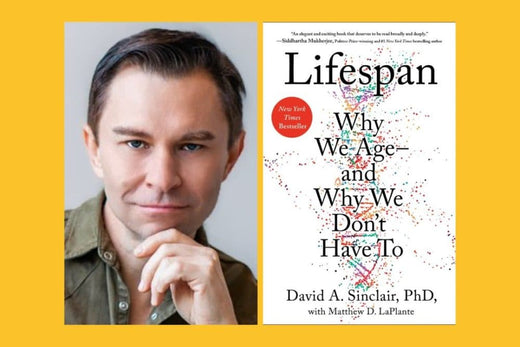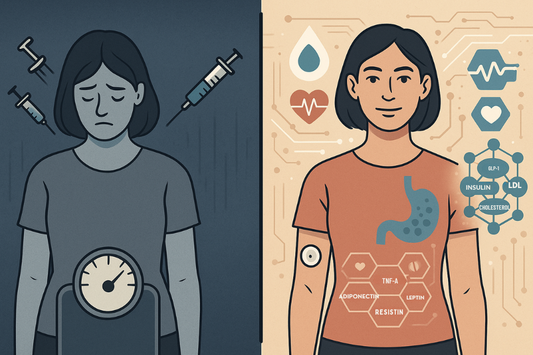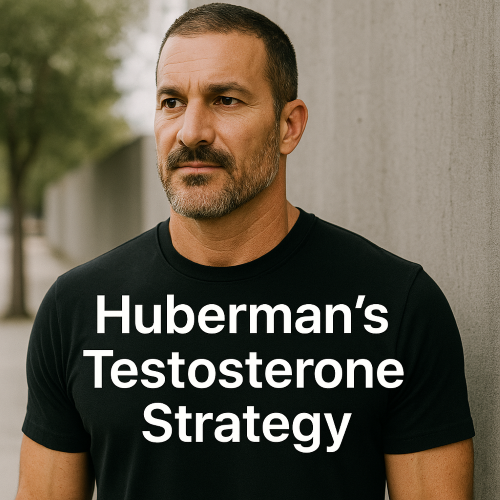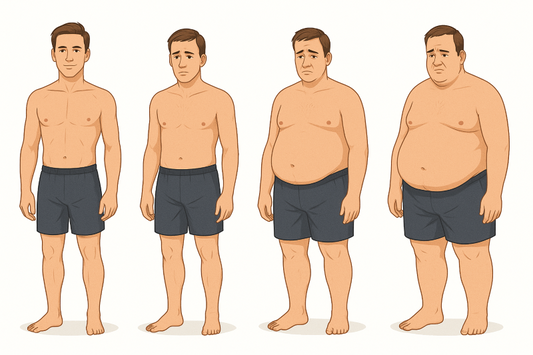Professor David Sinclair is a renowned podcaster, author, educator, and geneticist at Harvard University. He has also caused some controversy in the longevity world due to his involvement in the reversal of NMN as a supplement in the US (see below).
He has shared his personal supplement regimen, detailed in his book "Lifespan" and various interviews.
In this article, I have given my thoughts on each longevity supplement he takes, including the highly popular NAD boosters. Hopefully, this will help you understand how they contribute to longevity, including their advantages and limitations.
I also give my take on the ones I agree with and the ones I don’t.
More details, including clinical references, are on the links for each.
Get Prof David Sinclair's supplement stack here.
1. Resveratrol (trans-resveratrol)
Resveratrol is a key component of Prof. David Sinclair's longevity regimen and is widely recognised for its ability to activate sirtuins, proteins associated with ageing and longevity.
It is hypothesised that increased sirtuin activity is the reason why some mammals like the bowhead whale seem to live exceptionally long lives.
Resveratrol is found naturally in grapes and berries and is essential in DNA repair and metabolic regulation, things you definitely want if you are promoting long-term health and resilience. Note: there is only around 1mg of it in a glass of red wine so I'm afraid that is not the answer.
- Dosage: 1 gram daily, ideally mixed in yoghurt or olive oil to improve absorption (equivalent to 500mg of trans-resveratrol).
- Pros: Supports heart health, offers anti-ageing benefits, and enhances NAD synthesis, essential for cellular energy and repair.
- Cons: Low bioavailability remains challenging, requiring specific pairing with fats to improve absorption.
Dr. Geoff’s comment:
Resveratrol has a strong body of evidence supporting its role in longevity and boosting NAD levels. It works synergistically with NMN, enhancing its effects.
Specifically, resveratrol activates sirtuin-1 (SIRT1), a key enzyme involved in DNA repair and metabolic regulation.
It mimics the effects of calorie restriction, promoting cellular health and longevity. Trans-resveratrol is twice as effective as regular resveratrol, so if you are considering it I recommend 500mg of trans-resveratrol daily. And yes, you need to take it with yoghurt or olive oil to ensure proper absorption.
Recommend but try to maximise absorption due to poor bioavailability.
2. Nicotinamide Mononucleotide (NMN)
At the forefront of longevity research, are NAD boosters. NMN and NR both work equally well. NMN, a precursor to NAD+, is central to DNA repair and sirtuin function, a key area of Prof David Sinclair's research, so it is no surprise to see it here.
You can read a more detailed research article I previously wrote about NMN here.
He controversially successfully lobbied the FDA to reclassify it as a medicine as his pharma company was researching it despite it already being classified as a non-pharma, much to the frustration of the longevity community.
- How it Boosts Longevity: NMN is a precursor to NAD+, vital for DNA repair and sirtuin function. It's been shown to improve various aging-related biomarkers. In fact sirutins are dependent on NAD to function.
- Dosage: 1,000 mg daily.
- Pros: Promising early research on reversing vascular ageing, muscle strength, exercise, sleep and improving metabolic health.
- Cons: High cost; long-term human studies still need to be improved.
Dr Geoff’s comment
If I had to take one supplement, it would likely be NMN. It has a significant impact, particularly on my mental resilience, concentration and energy levels. The fact that it is also helping improve my longevity is enough on its own. Prof David Sinclair takes 1000mg daily, but my reading of the research is that NAD levels appear to saturate with doses around 500mg.
NMN increases NAD in the mitochondria, which is undoubtedly a significant benefit.
I strongly recommend it after the age of 35 and if you struggle with brain fog, but I'm not convinced that you need 1000mg. A good alternative is NR (nicotinamide riboside) also a precursor which works in a very similar way.
3. Coenzyme Q10
An important antioxidant in Prof David Sinclair's longevity supplements, Coenzyme Q10 is crucial for mitochondrial function. If you are on statins it is definitely worth considering.
- Dosage: Not specified.
- Pros: It benefits energy production, heart health, and mitochondrial efficiency.
- Cons: Inconsistent results in longevity studies.
Dr Geoff’s comment
CoQ10 supplementation is a must if you are taking statins. It’s a key step of the energy production line (oxidative phosphorylation) in the mitochondria, so depleting it is not a great idea.
Statins block a key pathway called the mevalonic pathway, which, yes, will reduce cholesterol, but it is key for a number of essential molecules in the body, and CoQ10 is one of those.
There is strong evidence that mitochondrial dysfunction is linked to neurodegenerative diseases, with some mitochondrial therapeutics entering Phase IIb trials. I currently take 100mg daily but recommend 300mg (Coq10+) a day to my patients who have to take statins.
I strongly recommend it if you struggle with physical and mental energy—and it is essential if you are taking a statin as it blocks the body from making it naturally.
4. Vitamin D3
A pro-hormone that is mislabelled a vitamin. It is well known that it is essential for bone health and immune function. However, its function is wide-ranging, and every cell in the body has a vitamin D receptor (you can read more about it here). That is why it is important in potentially reducing ageing-related diseases, vitamin D3, is a critical component in Prof David Sinclair's supplement strategy.
- How it Boosts Longevity: Essential for bone health and immune function, and potentially reducing aging-related diseases like heart disease and Alzheimer’s.
- Dosage: At least 2,000 IU daily; 4,000 is best for most people (don't forget K2 should also be taken).
- Pros: It can be easily supplemented and is inexpensive; deficiency is linked to various health issues.
- Cons: Don't over-supplement as it can be toxic; check your levels if taking a high dose.
Dr Geoff’s comment
Vitamin D, a prohormone, is a powerful biohack. Every cell in the body reacts to vitamin D, so it's much more than just bone strength. Vitamin D deficiency causes low testosterone, low mood, and low energy. I take 4000IU per day and have done so for a long time.
I strongly recommend it. It's a no-brainer and a must in the winter if you live in the UK. More energy, better immune health, better hormones and stronger bones all lead to increased healthy life expectancy.
Article: How to take vitamin D safely
5. Vitamin K2
How it Boosts Longevity: Vitamin K2 is a key player in calcium regulation, working alongside Vitamin D3 to ensure calcium is deposited in bones rather than soft tissues. This supports bone health, vascular protection, and even muscle function, with emerging evidence linking it to reduced leg cramps and improved muscle health.
-
- Dosage: 180 to 360 micrograms daily MK7
- Pros: Improves bone density, prevents arterial calcification, supports cardiovascular health, and may alleviate leg cramps and muscle stiffness.
- Cons: Limited research directly connects K2 to longevity, though its overall health benefits are well-documented.
Dr Geoff’s comment
"If you’re taking high-strength vitamin D, Vitamin K2 is a must—it ensures calcium stays in your bones and doesn’t end up where it shouldn’t, like your arteries. It activates matrix GLA-protein (MGP), a key enzyme that prevents calcium deposits in blood vessel walls, protecting your cardiovascular system.
Recent research also suggests K2 plays a role in muscle health, particularly in reducing leg cramps and muscle stiffness, which is an exciting new area of exploration. This makes it a critical nutrient not only for structural support but also for overall mobility.
K2 is difficult to get naturally unless you’re a Natto fan, and most diets fall short. Look for high-quality K2 as MK-7 at around 250mcg daily, which offers better bioavailability and a longer half-life. Most good vitamin D3 supplements now include K2—check yours or add it separately. I strongly recommend pairing it with vitamin D for optimal results."
Strongly recommend getting it with your vitamin D, most good supplements combine both.
6. Alpha lipoic acid (ALA)
It is often overlooked, but it is a potent antioxidant.
How it Boosts Longevity: ALA is a powerful antioxidant that is included in Prof. David Sinclair's longevity strategy. It reduces oxidative stress—a key ageing driver—while supporting mitochondrial function and improving lipid metabolism. ALA addresses multiple aspects of age-related decline by enhancing cellular energy production and metabolic health.
- Dosage: While specific recommendations vary, clinical studies often use doses between 250-500 mg daily.
- Pros: Supports mitochondrial health, reduces oxidative damage, improves insulin sensitivity, and may protect against neuron damage.
- Cons: Limited long-term studies directly link ALA to longevity.
Dr. Geoff’s comment:
"ALA works on three significant longevity mechanisms:
- Mitochondrial health: ALA improves mitochondrial function, which is essential for cellular energy and resilience as we age.
- Lipid metabolism helps lower LDL cholesterol and improves insulin sensitivity, addressing key metabolic risks.
- Weight management: ALA suppresses appetite, enhances fat metabolism, and—together with improved insulin sensitivity—reduces fat accumulation, which plays a critical role in metabolic and overall health.
As a bonus, its ability to regenerate other antioxidants like vitamins C and E makes it versatile in supporting overall oxidative balance. While its effects on longevity are still being studied, its impact on metabolic health and mitochondrial support makes sense as an addition to a longevity strategy.
There is a genetic variant for sodium dismutase that is essential for managing free radicals in the body. If you suffer from aching muscles or joints then this could be highly beneficial, do you need to take it all the time? Unless you are exercising intensively or unwell, I don't think so.
6. Low-dose aspirin- it's still not clear to me
How it boosts longevity: Low-dose aspirin has been studied for its potential to reduce inflammation, lower the risk of heart attacks, and possibly decrease the likelihood of certain cancers all conditions that affect healthy life expectancy. However, its effectiveness in promoting longevity for all remains controversial due to conflicting research findings.
- Dosage: Commonly suggested dose is 70-80 mg per day.
- Pros: Anti-inflammatory properties and potential to reduce cardiovascular and cancer risks in specific populations.
- Cons: Increased risk of bleeding, particularly gastrointestinal, and potential stomach irritation. Research findings are inconsistent, suggesting that its benefits may depend on individual factors.
Dr. Geoff’s comment:
"This is a tricky one. Low-dose aspirin’s effectiveness depends on your underlying risk factors, such as cardiovascular disease or a predisposition to certain cancers. The conflicting research suggests that its effects may vary widely due to differences in population genetics or environmental factors.
This isn’t a one-size-fits-all solution. If you’re considering it, I strongly recommend discussing your individual risk profile with your doctor to determine if the potential benefits outweigh the risks in your case."
Pharmaceuticals
7. Metformin
How it boosts longevity: Originally developed as a diabetes medication, metformin is now being widely studied for its potential to extend lifespan. It works by improving insulin sensitivity, reducing blood sugar levels, and mimicking the effects of caloric restriction. It also appears to influence pathways associated with nutrient sensing, which plays a role in ageing. Studies suggest that it is a very strong longevity candidate. The lack of noise around it is probably more linked to the fact that there is no money to be made, the patents ran out a long time ago so it is an inexpensive medication with little financial incentive.
- Dosage: 200–800 mg in the evening (under medical supervision).
- Pros: Associated with a longer lifespan in diabetics, may reduce cancer risk, and addresses insulin resistance and cholesterol imbalances linked to ageing.
- Cons: Potential side effects include gastrointestinal discomfort, reduced vitamin B12 absorption, and the risk of hypoglycemia in certain individuals.
Dr. Geoff’s comment:
"Metformin shows great promise as a longevity drug. It addresses key issues linked to ageing, such as nutrient sensing pathways, insulin sensitivity, and cholesterol regulation. The science stacks up strongly for metformin.
The TAME trial, currently underway, is exploring metformin’s potential for healthy ageing and longevity.
For those seeking a natural alternative, berberine, a phytopharmaceutical, has similar actions and is worth considering—however, both metformin and berberine lower blood sugar levels, which may impair performance during strenuous exercise.
I recommend metformin only under the guidance of a doctor, ensuring you’re aware of its effects on energy levels and overall health. It’s a tool with great potential but requires thoughtful use.
I recommend it but only under the guidance of a doctor and being aware of the effects on your energy; hence, taking it in the evening makes sense and certainly not before a big workout. Some people have gastro issues with berberine, so it is not a win for everyone.
8. Statins- the controversial one I'm not convinced by
How they relate to longevity: Statins are widely used to lower cholesterol and reduce the risk of heart disease and cardiovascular disease the leading cause of death. Therefore, if you can lower this risk, then, in fact, you are increasing longevity.
However, their role in longevity protocols, such as those promoted by Prof. David Sinclair and Dr. Peter Attia, is controversial. While they effectively manage cholesterol, their broader impact on health and ageing remains debated. I know a lot of my patients have complained of muscle aches, loss of energy and weight gain.
- Dosage: Specific dosages depend on individual medical needs and are typically prescribed under medical supervision.
- Pros: Reduce the risk of heart disease, particularly for those at high cardiovascular risk.
- Cons: Potential side effects include muscle aches, fatigue, and disruptions in insulin and glucose regulation. Statins also deplete CoQ10, critical for cellular energy production, and may negatively impact brain health in some individuals.
Dr. Geoff’s comment:
"This is one I rarely recommend unless you’re at high risk as so much can be achieved on cholesterol profiles through diet and lifestyle. S
tatins work by blocking HMG-CoA Reductase, a key enzyme in the mevalonate pathway responsible for cholesterol production. The issue is that this pathway doesn’t just produce cholesterol—it also generates other essential molecules like CoQ10 and isoprenoids, which play crucial roles in energy production and insulin receptor function.
Blocking this pathway can lead to reduced energy, muscle pain, and increased insulin resistance, raising blood sugar levels—none of which are conducive to longevity. Managing your cholesterol through ApoB levels, Lipoprotein(a), and LAR (inferred LDL particle size) is fundamental, but traditional LDL and total cholesterol measurements are outdated and often misleading.
My advice? Avoid statins if possible. There are plenty of natural ways to achieve healthy cholesterol levels through diet, exercise, and supplements. However, if your ApoB or Lipoprotein(a) levels are exceptionally high or you’re at significant cardiovascular risk, statins may be appropriate—but only as a last resort."
Conclusion
Professor David Sinclair's longevity approach combines much more than a supplement regime.
Lifestyle choices, dietary habits, longevity hacks (saunas and fasting), and testing accompany his carefully selected supplement regimen. While these supplements promise to enhance longevity and health, it's essential to remember that they are part of an overall lifestyle, and he practises many other biohacks.
Each supplement's effectiveness can vary greatly depending on individual health conditions, genetic makeup, and lifestyle factors.
Disclaimer: This article is for informational purposes only and does not constitute medical advice. Prof. David Sinclair has not contributed to this article nor has he endorsed it. The information has been gathered from publicly available sources.
Interested in following Prof David Sinclair? We have put together these supplements into a stack here: David Sinclair Longevity stack or you can check out other longevity stacks we offer including the one I take and NAD boosters.






